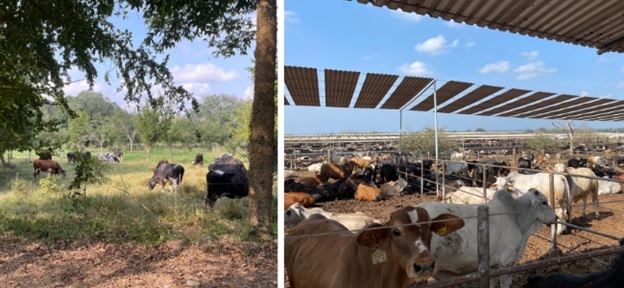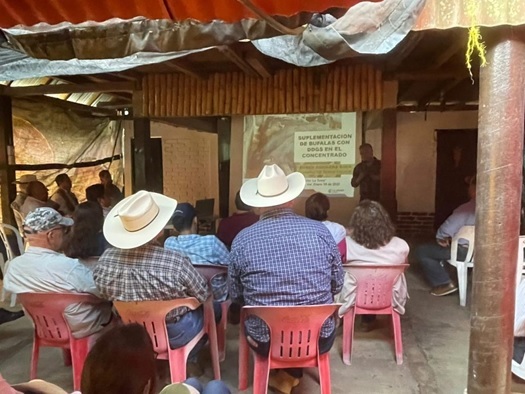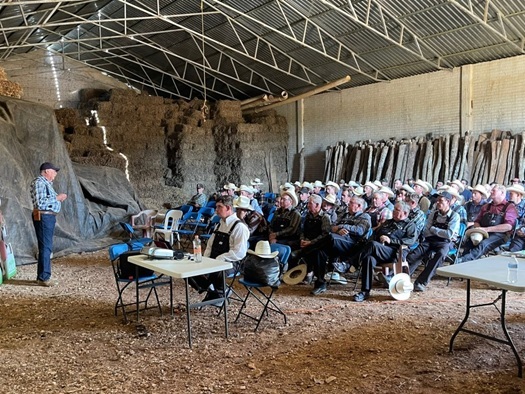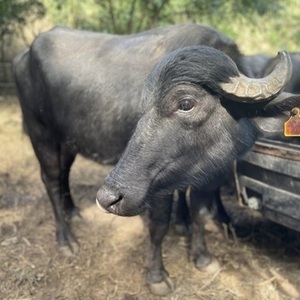USGC markets DDGS in southeast Mexico





SOURCE: U.S. Grains Council
January 27, 2023
BY U.S. Grains Council
When thinking of emerging markets for U.S. grains and co-products, places like Africa and Southeast Asia may easily come to mind. Southeast Mexico, however, may hold the key to new opportunities in a country that has been a strong partner for U.S. agriculture throughout the years.
In January, U.S. Grains Council staff spent time in the southeastern region of Mexico, sharing the results of distillers dried grains with solubles (DDGS) trials with ranchers in the area who have not been aware of the product and its nutritional components in their animals’ feed.
“Southeastern Mexico is the country’s source for feeder cattle in northern Mexico. Producers rely on grassing and dual purpose to manage their cattle. By teaching how to supplement their cattle with DDGS-based concentrates, we are helping them become more efficient and productive,” said Javier Chávez, USGC marketing specialist in Mexico.
“This market is very spread out, and no grain company has the ability to reach them as the Council does with their programs. Perhaps, in the short term, the results are difficult to measure, but as some of them grow, they will have the backing that our educational program has given them along with the development of suppliers to the region that we hope will become important end users as well.”
Advertisement
Advertisement
Follow along in the photo essay below to learn more about the Council’s work in the region to educate farmers on the benefits of DDGS.
In Veracruz, Mexico, staff visited a ranch that has been taking part in a DDGS trial on water buffalo conducted by USGC. Since the buffalo do well in the tropical environment and require less attention than cattle, buffalo are becoming more popular in the area. Their milk is better quality, they live longer and have higher fertility rates than cattle. While the owner of the ranch did not use DDGS before the trials, he plans to now after seeing the results.
The trial presentation was offered to government officials, ranchers, researchers, feed millers and academic representatives. Javier Chávez, USGC marketing specialist in Mexico, gave an overview of the Council’s work before Ruben Aguilera, USGC consultant presented the results of the DDGS feeding trials, which were positive. The audience had many good questions and seemed interested in learning more about DDGS and its supplemental qualities in feed.
Advertisement
Advertisement
On the second day of the program in Veracruz, USGC staff visited two cattle ranches, both of which have seen the benefits of DDGS use thanks to the Council and its work in the region. The ranches varied in size, but both offered great feedback on their experiences with DDGS use for beef and dairy cattle.
To close the program, the team traveled to Campeche, Mexico, where they presented the results of two different DDGS trials – one on calves and the other on dairy cows – to the Nuevo Durango Mennonite camp. USGC Consultant Eduardo Christensen presented the results before USGC memorandum of understanding (MOU) partner PROMEXA offered an overview of its DDGS base concentrate.
Follow the Council on social media to see more photos and videos from these DDGS trial presentations.
Related Stories
Broco Energy on July 17 announced a new partnership with the Massachusetts Port Authority (Massport) to deliver and transition Massport's fuel tanks to renewable diesel across its various facilities.
Shell Aviation, Accenture, and Amex GBT on July 10 announced Avelia is in the process of evolving to an industry solution with independent data hosting and a multi-supplier model helping users access the GHG benefits of SAF.
The U.S EPA on July 17 released data showing more than 1.9 billion RINs were generated under the RFS during June, down 11% when compared to the same month of last year. Total RIN generation for the first half of 2025 reached 11.17 billion.
The U.S. EPA on July 17 published updated small refinery exemption (SRE) data, reporting that six new SRE petitions have been filed under the RFS during the past month. A total of 195 SRE petitions are now pending.
European biodiesel producer Greenergy on July 10 confirmed plans to shut down its biodiesel plant in Immingham, Lincolnshire, U.K. The company temporarily suspended operations at the facility earlier this year.
Upcoming Events










